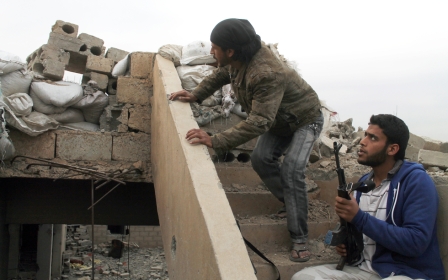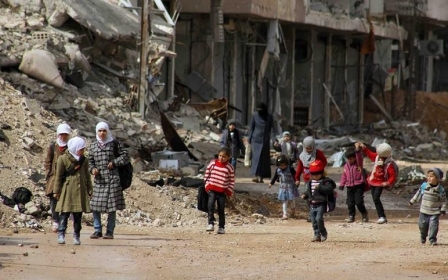Syrians vote in Assad-held areas for new parliament

Syrians are voting on Wednesday in areas controlled by President Bashar al-Assad's government in parliamentary elections dismissed by the opposition as illegitimate.
The vote, which will elect a new 250-member parliament, coincides with the beginning of a second round of UN-brokered peace talks in Geneva aimed at ending the devastating five-year conflict, with Assad's future a key sticking point.
About 7,200 polling stations opened at 7am (4am GMT) in government-held areas - in 12 out of 14 provinces, about a third of the country's territory, where about 60 percent of the population lives.
Neither Raqqa, the northern province controlled by the Islamic State militant group, nor Idlib, controlled by the al-Qaeda-affiliated al-Nusra Front, have voting stations, AP reports.
The polls will remain open for 12 hours unless the electoral commission decides to extend the deadline.
Assad's Baath party, which has controlled the country for more than half a century, is expected to extend its dominance of parliament, although several parties are participating in the polls.
"I voted because this election will decide the country's future. I hope that the winners will be true to the nation even before being true to the voters," said Yamin al-Homsi, a 37-year old who voted in Damascus.
Samer Issa, a taxi driver, said he had "fulfilled his national duty" by casting his vote. "Now, it's up to the winners to fulfil their promises," the 58-year-old said.
The presidency published photos of a smiling Assad and his wife Asma casting their ballots in Damascus and speaking to volunteers at the polling station.
"We have been at war for five years but terrorism has failed to reach its main goal, which is to destroy Syria's social structure and identity as safeguarded in the constitution," Assad said.
The domestic opposition which is tolerated in Damascus last month called for a widespread boycott, accusing the government of using the vote to gain leverage in Geneva peace talks.
The High Negotiations Committee, the main opposition body involved in the talks, has branded the election "illegitimate".
'Elections of resistance'
The vote is the second ballot since the beginning of the war in 2011, and 11,341 candidates initially sought to run for the parliamentary seats.
About 3,500 government-approved candidates remain in the race, after the rest withdrew "saying they had no chance of winning", Hisham al-Shaar, the head of the Supreme Judicial Elections Committee, told reporters.
Walls across the capital Damascus were covered with campaign posters.
From the top of one of the city's tallest buildings a banner of the Baath party proclaimed "The elections of resistance".
Outside a polling station at the Damascus governor's headquarters in the eastern neighbourhood of Yusef al-Azmeh, representatives of various candidates distributed leaflets to potential voters.
But Mayssoun, 45, said she will not vote. "Most of these candidates are rich men who live abroad and are just feeding us nonsense," she said.
"I used to have an apartment in Yarmouk that I left because of the clashes, and now I move around from place to place," the waitress said.
The Palestinian refugee camp of Yarmouk in southern Damascus was home to 160,000 people - including Syrians - but has been ravaged by fighting.
The controversial polls come at a tense time with a surge in violence in recent days threatening a fragile six-week ceasefire.
UN Syria envoy Staffan de Mistura will try again to reach a consensus at the talks starting Wednesday in Geneva on ending a war that has killed more than 270,000 people and displaced half the population.
The negotiations are aimed at agreeing a roadmap to peace, including forming a transitional government followed by general elections.
New MEE newsletter: Jerusalem Dispatch
Sign up to get the latest insights and analysis on Israel-Palestine, alongside Turkey Unpacked and other MEE newsletters
Middle East Eye delivers independent and unrivalled coverage and analysis of the Middle East, North Africa and beyond. To learn more about republishing this content and the associated fees, please fill out this form. More about MEE can be found here.




